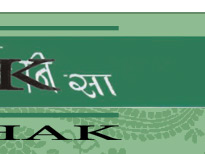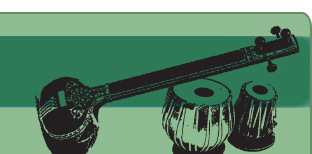 The Art Karat Excellence Award presented, Feb 2014. 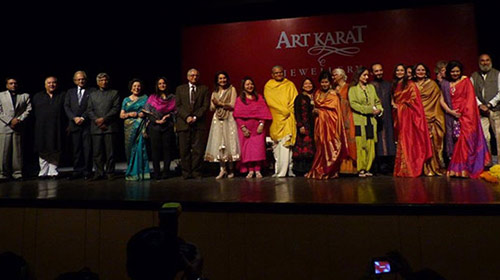
VSK Baithaks are, in essence, the public
face of a personal passion of an individual- Vinod Kapur.
Starting tentatively in 1998, as a kind of an experiment of
presenting music in an informal and personalized format, completely
different from the manner in which classical music is performed and
heard in the auditorium, VSK Baithaks have over the past 12 years,
acquired not only a unique identity but also a position of absolute
credibility with the music aficionados of Delhi. Through personal
experience the Rasiks are confident that no matter who the
performing artiste, the extended session of music that that they
will listen to in the informal and friendly ambience of the Baithaks
will touch their hearts, like nothing else does. During the course
of its journey so far there have been 70 VSK Baithaks. Over 70
artistes have performed at the Baithaks, mainly vocalists and a few
instrumentalists supported by scores of accompanists. These artistes
and accompanists, some of whom have performed more than once, have
come from all parts of the country. Amongst them are most of the
leading names, several artistes who are not heard on the regular
musical Stage of Delhi, and a number of brilliant new voices. Many
of the artistes, who were introduced to Delhi audiences by the VSK
Baithaks, are now amongst the leading names of India.
VSK Baithak in fact has gained the stature of a trusted Brand. A
brand which assuredly delivers highest quality music in a friendly
and informal traditional setting. No less it provides a much sought
platform to artistes - the best known names, the lesser known names
and the upcoming names- for connecting with the most responsive
music audience of Delhi. The reputation and standing of VSK Baithak
extends through out the Country and interestingly term "Baithak"
is now a part of the music lexicon of the country and beyond.
The story of VSK Baithak is not an outcome of a premeditated
design. It is a story of evolution through seemingly innocuous and
happy coincidences. Happenings that go back to long before 1998.

Sowing of the seed During the 80's Drawing Room Baithaks, were
a regular feature at the residence of Vinod Kapur in Panchsheel Park
. These music sessions would commence after dinner and go on for
long hours till late at night. Occasionally a few young teenage
friends of Vinod Kapur's son Rahul, would drop in on such evenings.
They had no interest in the music but it was fun for them to witness
the informal conviviality and joy that were the hallmark of such
sessions. One of them, a youngster who was particularly close to
Rahul was Rohit Khattar.
Years passed. In 1993 soon after their youngest daughter got
married, Kapurs decided to move away from the rented home in
Panchsheel Park to their farm in Gurgaon. In the mean time Rahul had
grown up and joined the family business. Rohit who belonged to a
family in the Hospitality business not only went on to join the
family business but also established a new Company - Old World
Hospitality - which had acquired the contract to manage the "public-face"
activities of India Habitat Centre. Rahul and Rohit continued to be
the closest of friends.

April 6, 1998 6th April 1998. It was Rahul's birthday
gathering, after a considerable gap of time. Rohit and Vinod Kapur
caught up with each other. Conversationally Rohit enquired "Uncle,
now that you have moved to Gurgaon what has happened to those
fabulous music evenings you used to have at Panchsheel Park?"
He was surprised to hear that the music gatherings were going strong
and that people were travelling all the way from Delhi to Gurrgaon
to share these evenings. Sensing an opportunity to further embellish
the cultural scenario of Habitat Centre, he asked "Uncle Vinod"
would consider having similar music evenings at the Habitat in
collaboration with Old World Hospitality. "Rohit"
responded Vinod Kapur "You know my music is Drawing Room Music.
If you can provide me to that kind of setting may be we can take the
idea ahead" Rohit was clear in his mind. "It will,
precisely the way you want it". A few weeks later Vinod Kapur
prodded again by Rohit, visited the Basement of Habitat Centre.
Though at the point it looked bleak and black, he visualized its
potential. He shared his vision and thoughts with Arsheya Sethi, who
had accompanied him and who was then looking after the cultural side
of Habitat. Arsheya made a written note of all the specific details
listed out by Vinod Kapur and assured him that everything suggested
will be implemented. On this assurance, the date for the first VSK
Baithak was fixed. 28th August 1998. Vinod Kapur called up Pt. Rajan
Sajan Mishra in London and they agreed to sing. To give this
experiment with music in a public place a name he decided to call it
"VSK Baithak".

28th August 1998 - the First VSK Baithak Vinod Kapur had laid down stringent
specifications to ensure that the ambience of the Baithak would be
as close to that of a friendly informal Drawing Room setting as
practical. However, he was at heart more than a little sceptical
whether the Habitat team would be able to so deliver. To ensure that
there were no significant glitches; on 28th August Vinod Kapur
arrived at Habitat about 90 minutes before the scheduled time of the
Baithak. He was astounded "All my expectations had been more
than exceeded" The steps down to the Basement were wreathed in
flowers. There was a detailed arrangement to take care of the
footwear, which all the Rasiks were required to take off. Tea/Coffee
and cookies were laid out to welcome the guests. The doors of the
Basement Hall opened to the friendliest of settings. At the far end
there was florally decked up low stage with an elegant floral
backdrop. Sparkling white "Chandni "had been spread out on
the floor interspersed with colourful bolsters. There is a single
row of chairs at the rear, along the wall, for those who could not
sit on the floor. The place was glowing with cheer and colour and
friendliness. And the contoured walls of the Basement reached out
like arms to hold every one in a warm entrance. Shubha Mudgal
graciously agreed to get the evening going and introduce the
artistes. Rajan Sajan Mishra, taken up by the ambience and
responsiveness of a hall full of Rasiks, were in an inspired mood.
The music went on till midnight, with an intermission during which
the Rasiks were able to access delectable snacks that Habitat had
laid out for them. The Baithak was an unprecedented happening and an
unprecedented success. It was a face of classical music, which had
never been witnessed earlier. It was a new experience and what is
more, a very fulfilling experience. And no less it was an uplifting
experience for staff of Habitat establishment, who had put in a
special effort to create the perfect ambience.

Till 10th March 2005 at the Basement of India Habitat Centre Following this happy and auspicious
beginning VSK Baithaks went from success to success, from accolades
to accolades, attracting not only established Rasiks but also many
who otherwise had never believed that they would enjoy classical
music. The list of VSK Baithak Rasiks grew in numbers. Each Baithak
attracted newer faces and fresh entrants to what was turning to be
the VSK music family. Annually around 6 Baithaks were arranged
between September and April/May. Meantime the private Baithaks at
Vinod Kapur's residence at Gurgaon also continued. Given his
penchant for listening to upcoming artistes and these not heard on
the regular concert stage led him to "discovering" voices
that he felt deserved to be heard. Unhesitatingly such artistes were
featured in the VSK Baithak. So credible and trusted had become the
image of VSK Baithak that all the featured artists whether a known
name or unknown name received warm response and burgeoning
audiences. The VSK Baithak would always be full, no matter who the
artiste. And when there was a well known popular artiste, the Rasiks
would overflow into the lobby and even onto the stairs. It had
dawned, as a new found realization amongst the Rasiks, that the
Baithak ambience brought the very best out of each artiste - well
known or otherwise. The Baithak acquired the image of a Happening
that the Rasiks of Delhi looked forward to; artistes, the country
over, looked forward to; and no less the staff of Habitat Old World
- looked forward to for the celebratory spirit that the event
evoked.
During the period 1998 and 2005, 44 VSK Baithaks had taken place
and each of them was a musical success. Some perhaps more than
others It was an extraordinary track record of music which evoked
delight amongst Rasiks. And possibly in some quarters a tinge of
envy.

10th March 2005 - the last VSK Baithak at India Habitat Centre On 10th March it was the 44th VSK Baithak
in the Habitat Basement. It featured Pt. Ulhas Kashalkar. Between
the repute that VSK Baithak had attained and Ulhas Kashalkar's
popular standing, the Basement had overflowed its brim and Rasiks
had even filled up the stairs leading to the upper level. It was a
musically and in term of response a huge success. But it also opened
up a can of worms. A music critic writing in his newspaper column,
spoke very warmly about the music and audience response, but then
went on to allude to the " safety" aspect of such an
overcrowded gathering . The concern was not unjustified.
44 Baithaks through 7 years had established beyond a shadow of
doubt that the VSK Baithak and India Habitat Centre Basement were
indeed "Made for each other". Vinod Kapur was faced with a
huge dilemma. Should he continue the Baithaks at the Habitat and
restrict entry to comply with the " safety norms" which
put its capacity at an absurd 150 ; or should he move away to a
larger place, which even it was not so elegant and so " perfect
" could accommodate all the many that came to listen to the
music at the Baithaks. Declining entry to anyone who had come to
listen to music, because, technically, as per the rules in the Book
the place was full, went against his grain. VSK Baithaks had come to
occupy a special place in the hearts of Delhi Rasiks; it had become
an event that they looked forward. It had to acquire a cultural
dimension in the public domain. There was no choice really, and it
was one of the most painful choices that he has had to make. And so,
Vinod Kapur with a sad heart decided to move VSK Baithak away for
the Basement of India Habitat Centre, where it had been so fondly
nurtured for 7 years. The Baithak had grown to a dimension that
could not be "safely" contained in its Basement of the
Habitat Centre. Or so the "Rule Book" said.

Since March 2005 - Sri Sathya Sai International Centre Basement Delhi is a huge metropolis. And yet it is
amazing how near impossible it is to locate one venue in South
Delhi, which has an air-conditioned flat surface to accommodate
300-400 people, a small room to serve as a Green Room, clean
toilets, and reasonable car parking space. At the end of extensive
search the nearest fit was the Basement of Sri Sathya Sai
International Centre. Not ideal by a long stretch, but it could
serve the principal purpose. The huge granite floored basement
required to be "engineered" to yield Baithak space and a
lobby. The enormous stage had to be screened to create an ambience
of closeness between the artist and the audience. The entire area
Basement had to be wreathed in cloth curtaining and carpets laid on
the floor to render it acoustically acceptable. All this called for
huge effort and massive inputs each time. There were several draw
bocks but it was centrally located; it was air-conditioned and most
importantly it could accommodate all the Rasiks who chose to come.
And thus from Sept. 2005 till April 2010, 22 VSK Baithaks have been
held in this venue. Each of them in terms of music and audience
response has been a great success. Not withstanding the attendant
problems with Parking and Green Rooms. And occasionally intrusive
sounds from the concurrent programmes in the Auditorium upstairs.

August 2009 - The Ravi Shankar Centre - Chanakyapuri In 2009, VSK Baithak got invited to use
another venue for its music. The Ravi Shankar Centre in
Chanakyapuri. It is an absolutely delightful venue much like the
Basement of the Habitat Centre. It has a friendly air and is ideally
suited for Baithaks. But it is also not without some issues.
Currently the air-conditioning is inadequate for any period other
than end November to Middle March. The capacity of the hall is
limited to around 175. And it is located in relatively isolated part
of New Delhi. Nonetheless 4 VSK Baithaks have been held at this
location from August 2009 to March 2010 on basis of "Invited "audiences
to keep the members controlled. Musically each of these has been an
unqualified success. It is hoped that the air-conditioning will be
enhanced to enable this venue to be used on a year round basis. It
would be a huge pity if such a beautiful and otherwise appropriate
location was to remain handicapped so severely for want of a few
air-conditioners. |
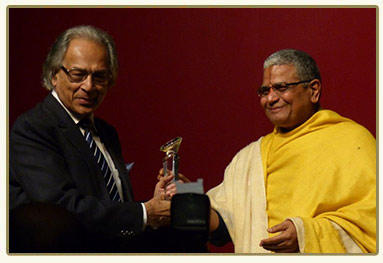
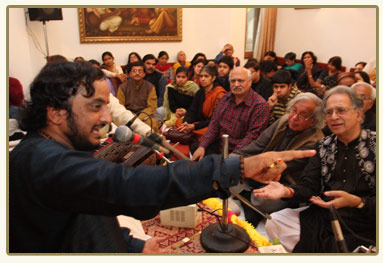
|

